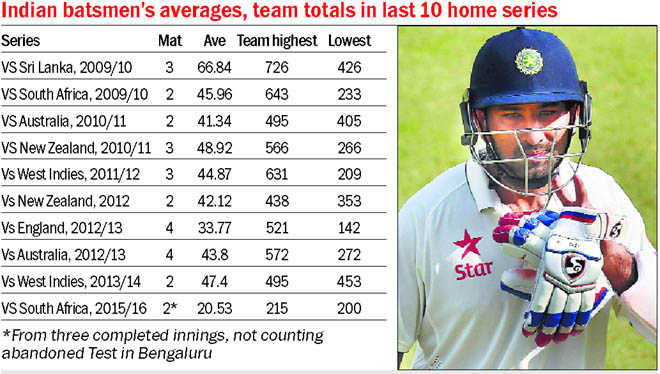
Rohit Mahajan
Tribune News Service
Nagpur, November 25
His peers rank Sunil Gavaskar’s final Test innings, the 96 against Pakistan in Bengaluru in 1987, as arguably his greatest ever knock on wickets that turned square.
So what was so perilous about that pitch? “The ball was bouncing and jagging up a lot,” Gavaskar told this writer today. “The surface was extremely loose, and the ball was taking out divots (pieces of the turf/soil) after it pitched.”
By all accounts, that wicket was horribly difficult to bat on — in comparison, the wickets in the current series are rather gentler. However, there’s a big difference between 1987 and now. The huge turner in Bengaluru came after four Tests in which the wickets were flatter — India made 527/9, 403, 465/8 and 323 in the first innings of those four Tests, which all ended in draws. Bengaluru, thus, was set up as a result wicket. India slumped to 145 and 204, while Pakistan made 116 and 249. India lost by 16 runs.
Changing paradigm
That Bengaluru turner, thus, was an exception. In the current series, though, big turners are routine.
Something very peculiar is happening in Indian cricket. We’re witnessing a very significant change in the way we see and play Test cricket here. The Indian team management is creating a new paradigm for Test cricket in which it would be very normal for the ball to turn a lot on the first day. A century would be a rarity. No innings would require the use of the second new ball, because innings wouldn’t last 80 overs.
Historically, India has seen an excess of runs in home series over the years. Now we’re witnessing an era of parsimony, in which the pitches are dusty, the runs are difficult to get, and it’s not novel to see 15 wickets fall in a day.
In their three completed innings of this series, India have lost 30 wickets in scoring 616 runs — that works out to an average of 20.53 runs for each batsman. Before this series, from 1933, the Indian batsmen have scored in India at an average of 35.89 runs an innings. So, in this series, we’re seeing an Indian batsman score 15 runs lesser than the past. This is a huge difference, the reason we’re witnessing three-day Test matches in India with regularity. The last four Test matches that had a result in India lasted less than three days each.
Queered pitches
India are increasingly rolling out a turner in every match now. This they attempted against England in 2012-13, and this they’re doing now against South Africa.
Big turners have created severe problems for the batsmen, for they don’t have the physical and mental skill to last long on such tracks.
Physically, the batsmen don’t have the skill to read the ball off the bowler’s hand and off the pitch; they often play the ball with hard hands, and so it pops up after hitting the bat’s edge; they don’t have the footwork that the great batsmen of the past had.
Mentally, most batsmen don’t have the discipline to bat for three-four sessions; batting long on square turners is a test of patience, and the modern batsman lacks this; finally, in this era of T20 cricket, flamboyance and thrilling strokeplay are valued more than grittiness. Doggedness is a huge talent — but it’s rated lower than a batsman’s grace or creativity.
“Patience is a very, very important virtue here (on such wickets),” India’s batting coach Sanjay Bangar said today when asked what the batsmen must do to last long on such wickets. “As well as playing the spinning ball well, and making sure you are trusting your defences all the time. Also, trying to get to the pitch of the ball as much as you can, and using the depth of the crease or using your feet.”
Clearly, the contemporary batsmen, including the Indians, are deficient in these skills. Thus the Indians are almost as vulnerable as the visiting batsmen when India opt for tracks that turn right from Day 1. Even rookie spinners of South Africa, Dean Elgar and Simon Harmer, have troubled India — 21 of the 30 wickets India lost in the series have fallen to the spinners.
In 2012-13, England’s spinners too had troubled India, and India lost the series.
Looking ahead
Will this policy of Day 1 turners continue? India clearly wouldn’t opt for it against teams with excellent spinners, like Pakistan or Sri Lanka.
But for now, the Indians have been bullish about this policy — right from Ravi Shastri to Virat Kohli to Bangar, everyone supports it with aggressiveness.
Thus, it seems we’re likely to see more three-day or four-day Tests in India. Harmer agreed today. “I think so,” said Harmer. “I don’t think the wickets are prepared to last five full days. The reason behind the preparation of the wickets is to get a result… So them playing one seamer, it’s clear what sort of wicket they are preparing.”



























